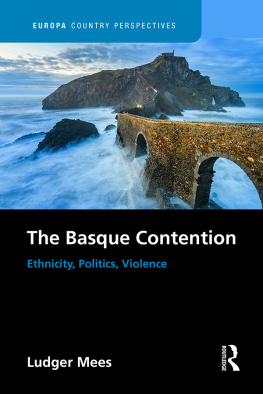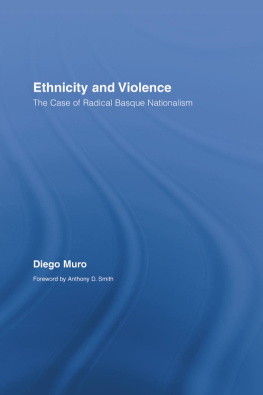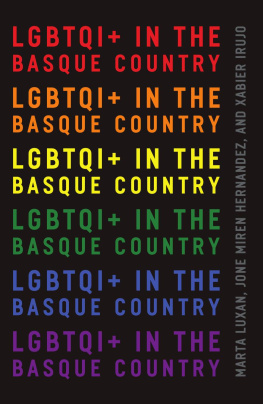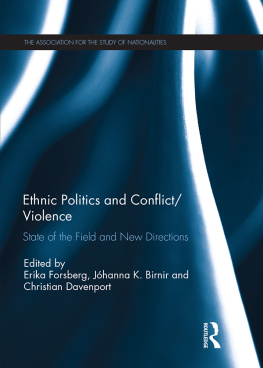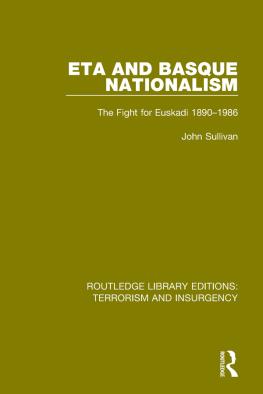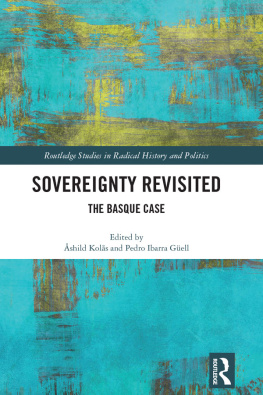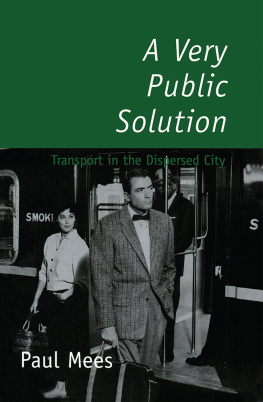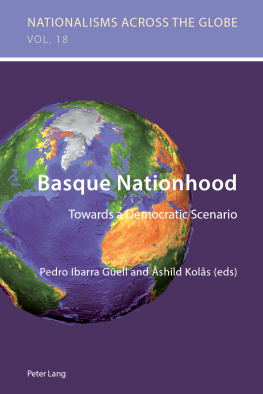The Basque Contention
To the outside world, for some half a century, the words Basque Country have provoked an almost instant association with the Euskadi Ta Askatasuna (ETA, Basque Homeland and Liberty) separatist group and violent conflict. The Basque Contention: Ethnicity, Politics, Violence attempts to undo this simplistic correlation and, for the first time, provide a definitive history of the wider political issues at the heart of the Basque Country.
Drawing on three decades of research on Basque nationalism, Ludger Mees weaves together the various historical and contemporary strands of this contention: from the late medieval kingdoms of Spain and France and the first articulations of a Basque ethno-particularism, to the dissolution of ETA in 2018, and all manner of dictatorships, conflict, peace, civil war, political intrigue, hope and failure in-between.
For anyone who has ever wanted to gain an insight into the Basque Country beyond the headlines of ETA and grasp the complexity of its relationship with Spain, France and indeed itself, this volume provides a detailed, yet digestible, basis for such an understanding.
Ludger Mees completed his PhD in History at the University of Bielefeld, Germany and was Assistant Professor at the same institution before taking up a lectureship at the University of the Basque Country, Bilbao in 1991. Since 2004 he has been Professor of Contemporary History at the University of the Basque Country and between 2004 and 2009 he was also Vice-Chancellor. He is author, co-author or editor of 17 books and about 120 articles and book chapters in the fields of nationalism, social movements, historiography and agrarian history.
Europa Country Perspectives
The Europa Country Perspectives series, from Routledge, examines a wide range of contemporary political, economic, developmental and social issues from areas around the world. Complementing the Europa Regional Surveys of the World series, Europa Country Perspectives is a valuable resource for academics, students, researchers, policymakers, business people and anyone with an interest in current world affairs.
While the Europa World Year Book and its associated Regional Surveys inform on and analyse contemporary economic, political and social developments at the national and regional level, Country Perspectives provide indepth, country-specific volumes written or edited by specialists in their field, delving into a countrys particular situation. Volumes in the series are not constrained by any particular template, but may explore a countrys recent political, economic, international relations, social, defence, or other issues in order to increase understanding.
Political Change in Switzerland: From Stability to Uncertainty
Clive H. Church
Russian Nationalism and Ethnic Violence: Symbolic Violence, Lynching, Pogrom, and Massacre
Richard Arnold
Beyond the Drug War in Mexico: Human rights, the public sphere and justice
Wil G. Pansters, Benjamin T. Smith, Peter Watt
Greece in the 21st Century: The Politics and Economics of a Crisis
Edited by Constantine Dimoulas and Vassilis K. Fouskas
The Basque Contention: Ethnicity, Politics, Violence
Ludger Mees
For more information about this series, please visit: www.routledge.com/Europa-Country-Perspectives/book-series/ECP
First published 2020
by Routledge
2 Park Square, Milton Park, Abingdon, Oxon OX14 4RN
and by Routledge
711 Third Avenue, New York, NY 10017
Routledge is an imprint of the Taylor & Francis Group, an informa business
2020 Ludger Mees
The right of Ludger Mees to be identified as the author of this work has been asserted in accordance with sections 77 and 78 of the Copyright, Designs and Patents Act 1988.
All rights reserved. No part of this book may be reprinted or reproduced or utilised in any form or by any electronic, mechanical, or other means, now known or hereafter invented, including photocopying and recording, or in any information storage or retrieval system, without permission in writing from the publishers.
Trademark notice: Product or corporate names may be trademarks or registered trademarks, and are used only for identification and explanation without intent to infringe.
Europa Commissioning Editor: Cathy Hartley
Editorial Assistant: Lucy Pritchard
British Library Cataloguing in Publication Data
A catalogue record for this book is available from the British Library
Library of Congress Cataloging-in-Publication Data
Names: Mees, Ludger author.
Title: The Basque contention : ethnicity, politics, violence / Ludger Mees.
Description: First Edition. | Abingdon, Oxon ; New York, NY : Routledge, 2019. | Series: Europa Country Perspectives
Identifiers: LCCN 2019009352| ISBN 9781857439632 (Hardback) | ISBN 9780429262586 (e-Book)
Subjects: LCSH: BasquesSpainHistory. | BasquesFranceHistory. | BasquesEthnic identity. | Pais Vasco (Spain)Politics and government. | Pays Basque (France)Politics and government. | Pais Vasco (Spain)HistoryAutonomy and independence movements. | Pays Basque (France)HistoryAutonomy and independence movements. | Political violenceSpainPais VascoHistory. | Political violenceFrancePays BasqueHistory.
Classification: LCC DP302.B47 M44 2019 | DDC 946/.6dc23
LC record available at https://lccn.loc.gov/2019009352
ISBN: 978-1-85743-963-2 (hbk)
ISBN: 978-0-429-26258-6 (ebk)
For Jan and Oier, two young rooted cosmopolitans.
This book on the past, present and future of the Basque contention is a new intellectual proposal aimed at decoding the key elements of one of Europes most intricate political conflicts. It comes after now more than 30 years of talking, writing and asking questions about nationalism in general, and Basque nationalism in particular. It is also the result of a broader research project carried out thanks to the financial support provided by the University of the Basque Country (GIU 17/005), the Spanish Ministry of Economy and Competitiveness and the European Regional Development Fund (HAR201564920-P, MINECO/FEDER).
The basic premise of this book has greatly benefited from two central and indispensable conditions. The first is the end of ETA violence and the shape of a new more relaxed atmosphere within which an academic account of the Basque contention would no longer suffer the pernicious impact of threat or emotional partisan criticism from one side or the other. The second condition is the critical feedback that I have received over the last three decades from my students, colleagues and friends who have been enormously helpful in correcting and completing the results of my research in John Stuart Mills terms: The steady habit of correcting and completing his own opinion by collating it with those of others, so far from causing doubt and hesitation in carrying it into practice, is the only stable foundation for a just reliance on it.
While this critical dialogue has been a fortunate constant over the years, it was particularly stimulating throughout the preparation of this book owing to the intrinsic difficulty of summarizing the history of several centuries on a limited number of pages. At the risk of unfairness, I would like to single out some of the many people to whom I feel especially indebted. Niall Cullen has not only made a Herculean effort to fine-tune my written English and to hide as far as possible my evident limitations in this respect, but his thoughtful comments have also made me reconsider some of my arguments. Hans-Jrgen Puhle, Santiago de Pablo, Xos M. Nez Seixas, Andreas Hess and Aritz Farwell have undertaken the time-consuming task of reading the manuscript, which has greatly benefited from their comments and suggestions. I would also like to acknowledge my gratitude to the publisher, and especially to Cathy Hartley, for giving me the opportunity to launch and disseminate this book under the prestigious Routledge label. Last but not least, gratitude and at the same time apologies to my wife Begoa. I appreciate very much that, instead of filing for divorce when I was working on the book on Christmas Eve(s), she usually settled for a verbal scolding having prepared a fantastic Basque meal with a clear message: there are other and frequently more important and gratifying pleasures on earth than scientific endeavors.

